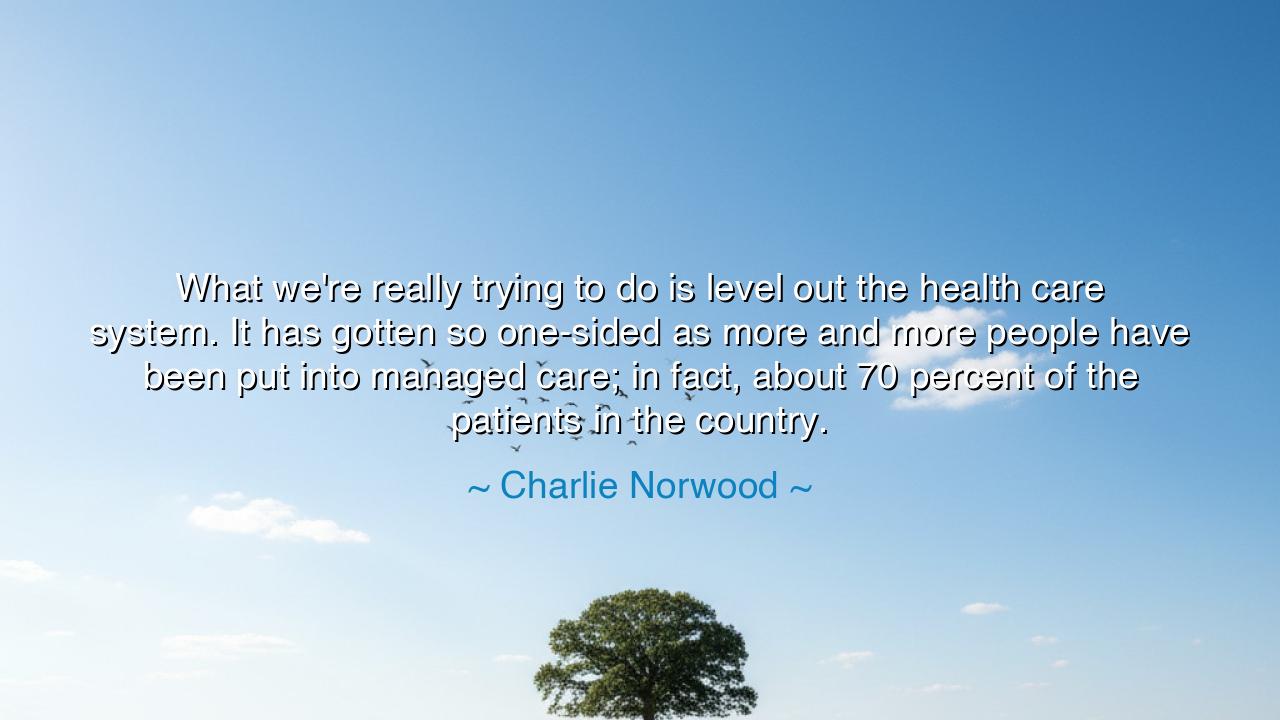
What we're really trying to do is level out the health care
What we're really trying to do is level out the health care system. It has gotten so one-sided as more and more people have been put into managed care; in fact, about 70 percent of the patients in the country.






In the voice of reason and reform, Charlie Norwood once declared: “What we’re really trying to do is level out the health care system. It has gotten so one-sided as more and more people have been put into managed care; in fact, about 70 percent of the patients in the country.” These words, though spoken in the language of policy, rise beyond mere politics — they are a call for balance, for justice, and for the restoration of fairness in the great temple of human well-being. For health care is not merely an institution of medicine, but a sacred trust between those who heal and those who suffer. And when that trust tilts too far toward profit or power, the balance of compassion and care must be restored.
Charlie Norwood, a congressman and a dentist by trade, was not a man born to the marble halls of government but one who rose from the common ground of service and integrity. Having treated patients firsthand, he saw not just the teeth and bones of his fellow citizens, but their struggles — their fear of costs, their confusion in systems built more for corporations than for people. When he spoke of “leveling out the health care system,” he spoke not as a politician chasing applause, but as a healer seeking to right a system that had drifted from its moral compass. He sought to restore equilibrium — to ensure that care served humanity, not bureaucracy.
The phrase “managed care” refers to the complex web of insurance systems designed to control costs and coordinate services. In theory, it promised efficiency; in practice, it often became a maze, where patients and doctors alike found themselves constrained by rules rather than guided by compassion. Norwood saw how this imbalance grew — how nearly 70 percent of patients were drawn into a system that no longer felt human, but mechanical. His words were both diagnosis and prescription: the health of a society can only thrive when access and fairness are its foundation.
The ancients, too, knew that balance was the essence of health — not just in the body, but in the state. Hippocrates, the father of medicine, taught that harmony among the elements sustains life, and that imbalance breeds disease. So it is with nations. When the power of care shifts too far toward profit or control, the spirit of healing becomes sick. Norwood’s insight was an echo of this ancient truth — that the body politic, like the human body, must be restored to balance if it is to endure.
Consider the story of Clara Barton, the “Angel of the Battlefield,” who founded the American Red Cross. In her time, health care, too, was fractured and chaotic. She did not wait for governments or institutions to act; she gathered the wounded, soothed their pain, and built a system rooted in compassion and service. Her courage leveled the field between the powerful and the powerless, between soldier and civilian. Her story reminds us that reform begins not with power, but with principle — with the unyielding belief that every life deserves care.
Norwood’s struggle for balance mirrors Barton’s. He understood that no system built upon inequity can survive long. The health care system is a reflection of a nation’s soul — if it favors the wealthy and neglects the poor, if it values procedure over people, then it becomes, as he warned, “one-sided.” The task, then, is not destruction, but restoration — to return the system to its purpose: healing. His call was one of moral clarity — that access to care is not charity, but justice; not luxury, but necessity.
Let this be the lesson: True balance is born from compassion and fairness. The healer, the leader, and the citizen all share in this responsibility. When you see a system — be it in medicine, law, or community — leaning too far to one side, do not turn away. Speak. Act. Restore. For balance is the foundation of peace, and peace is the seed of prosperity. Each of us, in small ways, can work to “level out” our world — to ensure that the gifts of life, health, and dignity are not hoarded, but shared.
And so, as Charlie Norwood taught, let us strive to be the stewards of balance — in policy, in heart, in action. Let us remember that health care is not about numbers or networks, but about people — the child who needs medicine, the mother who needs comfort, the elder who needs dignity. When we work together, guided by compassion rather than control, we honor the oldest oath of all: to heal the world, and to do no harm. In that sacred labor, we find not only fairness, but the very heart of humanity itself.






AAdministratorAdministrator
Welcome, honored guests. Please leave a comment, we will respond soon